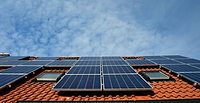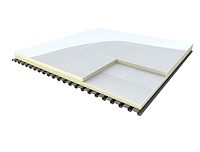Regulatory News
Tenn. Bill Exempts Low-Slope Roofs from Energy Standards
If signed into law, the bill would immediately halt requirements regarding heat emittance and solar reflection

The Tennessee legislature has approved a bill exempting low-slope roofing from the International Energy Conservation Code requirements related to albedo and radiant heat loss and sent it to the governor for signing.
— Image courtesy of WTVC-TV
The Tennessee Legislature on Tuesday approved a bill that would exempt low-slope roofs from the International Energy Conservation Code’s (IECC) solar reflectance and thermal emittance requirements. The measure now heads to Gov. Bill Lee’s desk.
For roofing contractors in the Volunteer State, the bill represented a potential reprieve from what many considered burdensome energy conservation codes.
Rep. Rusty Grills (R) introduced legislation in early February to amend the state’s energy requirements regarding albedo and emissivity; a companion bill was introduced in the state Senate. Grills represents Dyer, Lake, and Obion Counties, which sit along the Mississippi River.
House Bill 801 (HB 801) removes low-slope roofs from IECC standards that require compliance in climate zones 0 to 3 to reduce heat absorption and save energy. While some Tennessee counties fall within Zone 3, about 66% of the state is in Zone 4, where these standards do not apply.
Contractors in Memphis and counties to the north and east would realize the benefit from the bill’s enactment.
 The exemption is expected to lower material costs and potentially labor expenses due to more straightforward installations while allowing contractors flexibility in choosing material.
The exemption is expected to lower material costs and potentially labor expenses due to more straightforward installations while allowing contractors flexibility in choosing material.
The Republican-majority Legislature overwhelmingly approved both bills. The Senate passed its version in a unanimous 33-0 bipartisan vote, while the House passed HB 801 with 89 votes in favor and 10 against — all from the minority party.
Environmental groups opposing the bill, citing concerns about sustainability, argued that IECC standards, although potentially costly in the short term, were crucial for reducing energy consumption and promoting sustainable building practices.
The debate centered on striking a balance between economic practicality and environmental responsibility.
Is the Bill Legal?
While there isn't a strict federal mandate that forces every state to adopt the IECC code verbatim, there are federal requirements that influence state energy code adoption, specifically the Energy Conservation and Production Act.
Technically, states can adopt the IECC code, a modified version, or create their own codes — as long as they meet or exceed the federal requirements.
Practically, the federal government influences state energy codes, but it doesn't always mandate strict adoption.
What Happens Next?
Gov. Lee must now decide whether to sign the bill into law. If signed, it would take effect immediately. A veto — though unlikely — would send it back to the Legislature, where the strong support suggests an override.
If the governor takes no action, the bill will become law in 10 days, excluding Sundays.
Looking for a reprint of this article?
From high-res PDFs to custom plaques, order your copy today!






